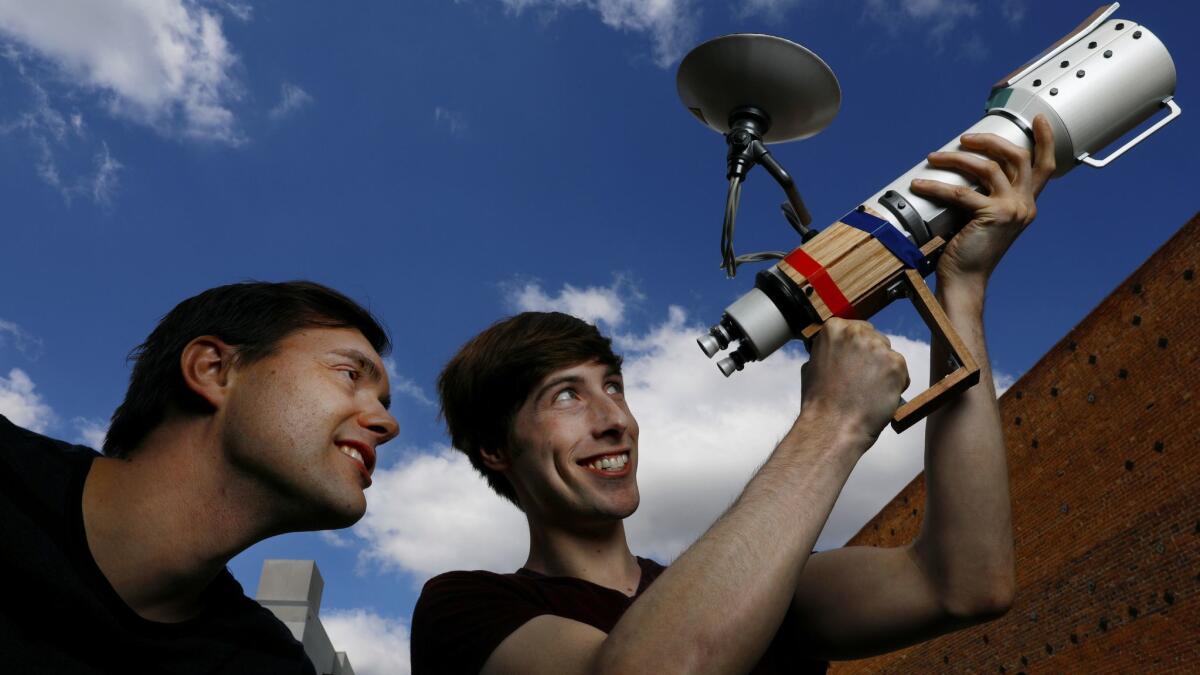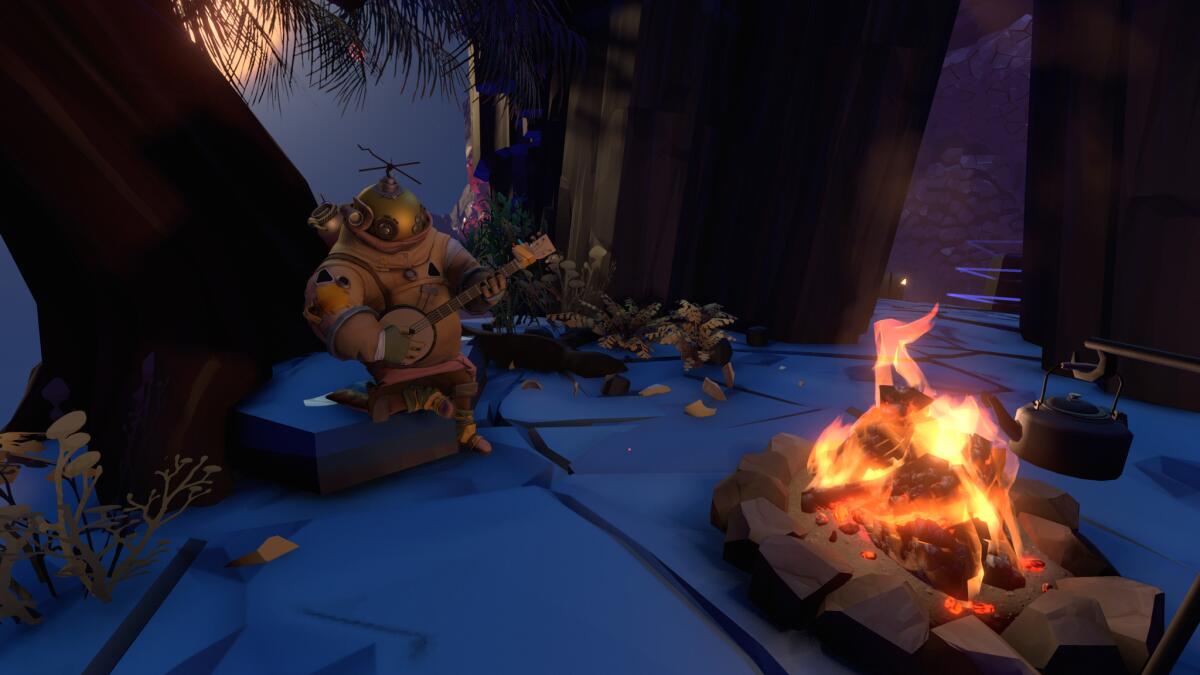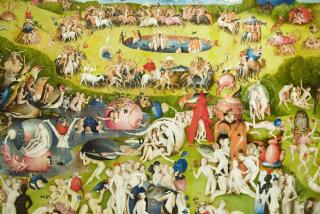‘Outer Wilds’ went from USC project to one of 2019’s most beloved games

- Share via
For a game in which the universe habitually self-destructs, “Outer Wilds” looks and feels rather serene. Banjo music relaxes the player, and the alien race at the game’s core is largely jovial, good-natured and inquisitive. Even their chalky blue skin tone is welcoming.
A sci-fi adventure with a folksy, down-home look and feel, many of its characters are oblivious to the true nature of the volatile galaxy they inhabit, one in which at least one planet is thrown into constant disarray due to unpredictable tornadoes. In fact, all the game’s environments are forever in flux due to an over-active sun that explodes every 22 minutes, about the length of the ordinary American sitcom.
“Outer Wilds” is one of the first major games from Mobius Digital, the downtown Los Angeles studio founded by Masi Oka, a lifelong gamer but also an actor best known for his role on “Heroes.” The title, which began as a thesis project in USC’s game program, presents us with a world more or less stuck on repeat.
A narrative adventure without combat or standard game progression — that is, one in which characters level up to become more powerful or crafty — “Outer Wilds” instead puts the emphasis solely on accruing knowledge. Unraveling why the sun perpetually erupts and what happened to a seemingly extinct alien race stand as the game’s central mysteries.
The project began in 2012 when Alex Beachum, the game’s 31-year-old creative director, was a master’s student at USC’s game school. It was at the university where Oka discovered Beachum’s game, which caught his eye at one of the school’s open houses for USC’s budding developers.
“The idea of exploring worlds is something that’s always unique,” Oka says. “I’ve never been a big violent game player. Ironically, I play ‘Destiny’ these days, but I didn’t play a lot of [first-person shooters] back in the day. So I liked the sensibility of doing something that’s smart, that’s kid-friendly, that adults can enjoy, and something that’s about curiosity, exploration.”
The project grew in scope and size after Beachum’s graduation, and in 2015 it became a darling of that year’s Game Developers Conference in San Francisco, where as part of the Independent Games Festival it won a cash prize of $30,000. A crowdfunding campaign later brought in more than $100,000. Then the interactive arm of Annapurna Pictures signed on as publisher, allowing Mobius to slow down, improve the visuals and smooth out the game.
“I was funding the game by myself,” Oka says. “Fortunately, I was on a show as a series regular, so I was able to fund a little bit of it, but, you know, I’m responsible for the livelihood of eight of my employees and my family members. Thankfully Annapurna came in and supported us and improved this to something that we’re proud of rather than something we have to get out.”

It’s not the only game with roots in USC’s game program expected to reach the market in 2019 (though “Outer Wilds” is essentially finished, a release date has not been set). Introspective puzzle game “Where Cards Fall” is destined for Apple devices later this year. USC Games director Danny Bilson says the titles that jump from class assignment to commercial release share a few common traits.
“The games that shop are the ones that take a little risk and are what we always say have an ‘honorable position’ — if you see a screenshot from that game, you know it’s that game.”
“Outer Wilds” was also something of a family project. Beachum’s sister Kelsey, who also contributed to Insomniac Games’ virtual reality title “Stormland,” served as the game’s writer. And for a game in which unspooling the narrative is the core objective, the task of piquing the player’s sense of wonder largely fell to her.
“You go into a game expecting to get missions and whatnot, and if you don’t have them, it can be a little bit disorienting at first,” she says. Her solution was to have the characters in the game ask the player what they want to do and where they want to go in space, with the hope that players will gradually create their own missions.
“I believe really firmly in pulling information as a player rather than having it pushed on me,” she says. “Possibly because I’m a games writer, I can’t stand it when games overload me with information. I’m like, ‘I’m never going to remember all of this.’ If I’m pulling information, I’m asking because I’m interested. I’m always going to remember that information so much more clearly. Because I feel like I have the agency there or I’m pursuing a particular quest.”
But even without evil aliens or space dragons, discovering all the conundrums of “Outer Wilds” will take more than keen observations. Surviving, after all, in a world forever shaken by what is essentially the instability of climate change has its own set of challenges.
Beachum, who has developed the game with fellow former classmate Loan Verneau, says three central tenets drive “Outer Wilds”: First, “a fragile feeling of space travel that feels realistic and dangerous — ‘Apollo 13’-style.” Second, the realization that “the world is chaotic, with natural forces changing over time. You can’t influence it. It will kill you, but you can understand it.” Finally, “exploring for the sake of curiosity and literally nothing else.”
At times, there can be a feeling of helplessness in the game. Though not nearly as tense as other media works with a ticking-clock setup — be it “The Legend of Zelda: Majora’s Mask,” which employed an actual clock and cinematic music, or the thriller-esque “Russian Doll” on Netflix — the characters in “Outer Wilds” who have become aware of the havoc-wreaking climate possess a sense of fearful resignation.

“As the sun gets bigger and bigger, they start to realize what’s about to happen and they start to freak out more and more,” Beachum says. “It’s a little tragic, actually, to sort of be caught in this loop of realizing the universe is about to end.”
Beachum, an avid camper, says the tone he wanted to capture was one of being alone out in nature and not quite knowing if a storm was on the way or what exactly lurked up ahead. A relatively contained game with six or seven planets — “depending on what you consider a planet,” he says — each has its own structure or weather system.
“You’re camping out around the fire, roasting marshmallows, looking up at the stars and philosophizing, and sometimes, you know, an avalanche happens,” he says. “Or you’re hiking and you’re going to go explore a cave. It’s that kind of mix. There are safe pockets, right? There are places in this world that are cozy.”
But don’t get too comfortable. For there could be a “giant murderous” sand dune heading your way.
Learning, then, to navigate each planet becomes something of a puzzle. The challenge is figuring out the rules of each locale. But though there are ancient texts to encounter and glowing orbs to manipulate — Beachum cites Colorado’s Mesa Verde National Park as a major influence on the game’s calming, natural look — and some spaces may bring to mind the recent, abstract puzzle game “The Witness,” he never wants the player to get stuck not knowing where to go or what to do.
Thus, there aren’t typical brain teasers. The game is designed to inspire inquisitiveness. Why, for instance, does a moon keep jumping from space to space? Maybe there was a rock in the home planet’s museum that behaved similarly? Maybe they’re connected?
“I love the feeling of setting out in a game and just having the whole world open and available to you and it feels like you’re setting out on that epic quest,” says Kelsey. “So I really love that we were able to create a game where we’re saying, ‘Yeah, you’re on this epic quest and it’s up to you where you want to go.’ We’re not going to say, ‘Go get eight gems and rescue a princess from the castle.’ ”
Follow me on Twitter: @toddmartens
More to Read
The biggest entertainment stories
Get our big stories about Hollywood, film, television, music, arts, culture and more right in your inbox as soon as they publish.
You may occasionally receive promotional content from the Los Angeles Times.











